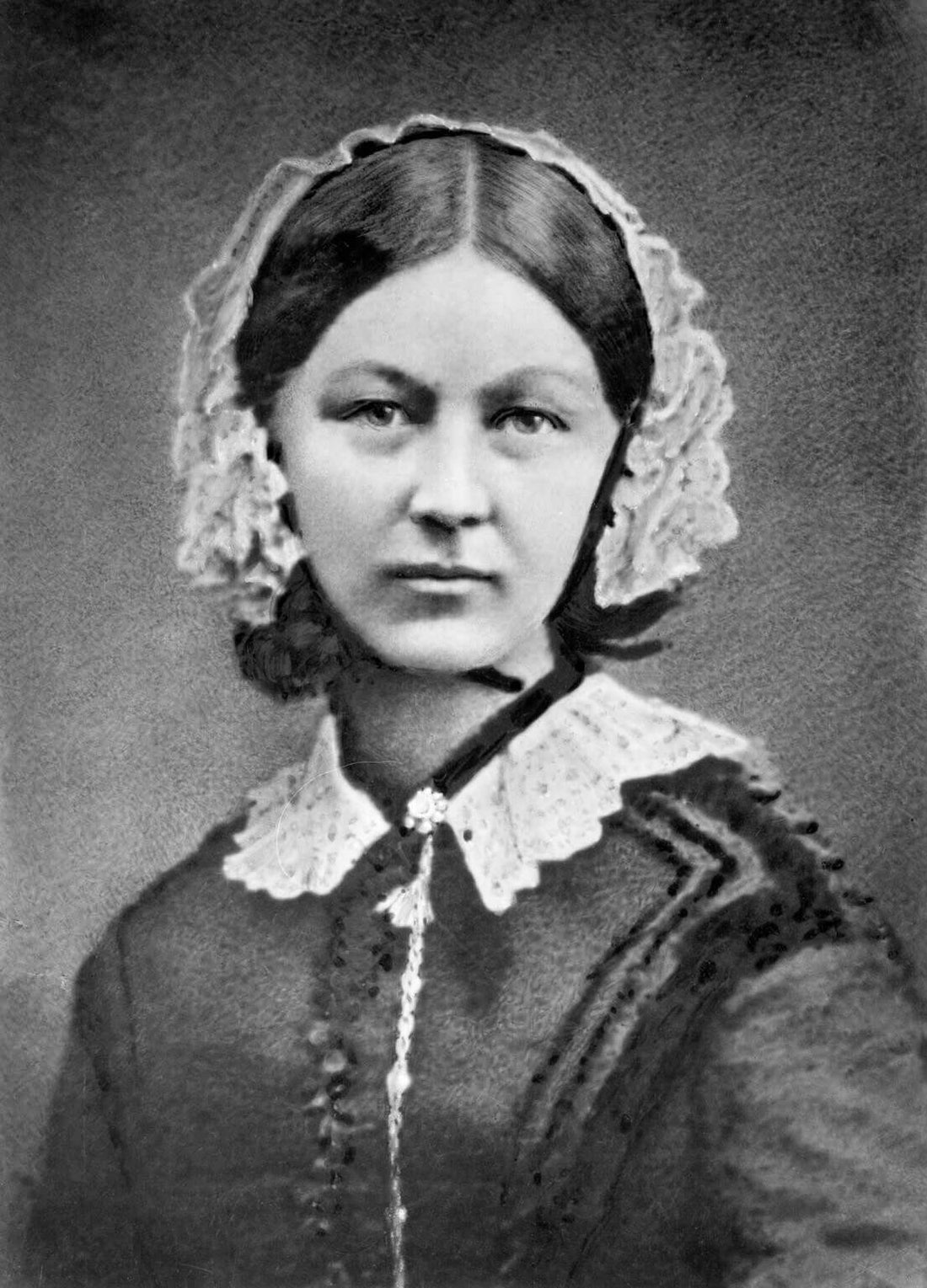Florence Nightingale: The Life and Legacy of the Lady with the Lamp
Read on to see how Florence's favourite perfume inspired our candle...
On a moonlit night during the Crimean War, a lone figure passed silently through rows of wounded men. Her lamp casting a soft glow, she moved with calm purpose, offering water, comfort, and care. Soldiers would later speak of her as if she were an angel—Florence Nightingale, “The Lady with the Lamp,” whose name became synonymous with compassion, courage, and reform.
Yet, the myth often obscures the complexity of the woman behind it. Florence Nightingale was not just a nurse; she was a statistician, writer, public health advocate, and social reformer. She revolutionised healthcare in Britain and beyond. She challenged the status quo, broke barriers for women, and used data and determination to make a tangible difference in the world.
And beneath her practicality and resolve lay a woman of refined sensibilities. Among her few indulgences was a soft, elegant fragrance: White Rose by Floris, a perfume she loved so much she had it shipped to her while serving in the Crimea. A letter of gratitude she wrote to Mr. Floris still survives—an evocative reminder that behind the legend was a woman of taste, intellect, and deep humanity.
Early Life: Privilege, Purpose, and Defiance
Florence Nightingale was born on May 12, 1820, in Florence, Italy, during her parents' extended European tour. The Nightingales were a wealthy, well-connected English family, and Florence’s upbringing was one of comfort, culture, and privilege. Her father, William Edward Nightingale, was an educated man with progressive ideas about women’s education. He ensured that Florence and her sister Parthenope were tutored in mathematics, philosophy, classical literature, and languages—an intellectual foundation rare for girls of their station.
Yet, from a young age, Florence displayed a restless spirit. While her sister was content to pursue marriage and society, Florence longed for something more. In 1837, at age 17, she experienced what she described as a “calling from God,” compelling her to a life of service. For Florence, this meant nursing—a radical choice for a young woman from an elite family.
At the time, nursing was not seen as a respectable profession. It was associated with drunkenness, illiteracy, and moral laxity. Her parents were horrified by her aspirations. For over a decade, Florence battled familial opposition. She turned down several marriage proposals, most notably from politician Richard Monckton Milnes, believing that marriage would limit her ability to fulfil her calling.
Training for the Fight
Despite the resistance, Florence persisted. She began to study healthcare systems in Europe and eventually trained as a nurse at the Institution of Protestant Deaconesses in Kaiserswerth, Germany, in 1851. She later studied in Paris under the Sisters of Mercy. These experiences shaped her philosophy of nursing as both a scientific and spiritual vocation.
In 1853, she became the superintendent of the Establishment for Gentlewomen During Illness in London—a position that allowed her to put her principles into practice. She focused on hygiene, patient dignity, and discipline—foundational ideas that would become cornerstones of modern nursing.
The Crimean War: The Crucible of Change
Florence Nightingale’s moment on the world stage came with the outbreak of the Crimean War (1853–1856), in which Britain, France, and the Ottoman Empire fought against Russia. Reports of appalling conditions in the British military hospitals—filth, overcrowding, and lack of supplies—outraged the public.
In 1854, Sidney Herbert, Secretary of War and a personal friend of Florence, asked her to lead a group of nurses to Scutari (modern-day Üsküdar, Turkey), the British base hospital. What she found there was a horror: soldiers lying in their own waste, rampant disease, and a death rate higher than on the battlefield.
With tireless resolve, Nightingale and her team cleaned the wards, set up kitchens and laundries, improved sanitation, and reorganised care. Initially met with resistance from military doctors, she persisted. With time, the death rate dropped dramatically—from 42% to just 2%, according to later analyses.
It was during this time that she became known as “The Lady with the Lamp,” immortalised in a poem by Henry Wadsworth Longfellow:
“Lo! in that house of misery
A lady with a lamp I see
Pass through the glimmering gloom,
And flit from room to room.”
The Personal Touch: White Rose by Floris
Despite the grim conditions and emotional toll, Florence Nightingale remained fastidious. She maintained personal discipline, routine, and dignity. One of her few luxuries in the Crimean frontlines was a fragrance: White Rose by Floris, the historic British perfumer established in 1730.
She loved the perfume so much that she arranged for bottles to be sent to her from Jermyn Street, London. In a surviving letter to Mr. Floris, she thanked the perfumer for providing the scent that brought her comfort amidst the suffering. This small detail reveals a more intimate side of Nightingale—the cultivated woman who, even in the face of unimaginable hardship, preserved a link to her past, her femininity, and the England she longed to return to.
That very letter now resides in the Floris archive, and the company still honours her legacy. Today, a portion of sales from their White Rose Eau de Toilette supports the Florence Nightingale Foundation, a charitable organisation that funds nursing scholarships across the UK.
The Work Continues: Reform and Research
Returning to Britain in 1856, Florence Nightingale was a national hero, but she was not content with fame. In fact, she largely withdrew from public appearances, choosing instead to focus on data-driven reform. Her war experiences had convinced her that most soldiers died not from wounds, but from preventable diseases caused by poor sanitation.
To prove this, she compiled reams of data and pioneered the use of infographics—notably her famous “coxcomb” diagram—to visually communicate her findings. This helped persuade Parliament and the military establishment to implement sanitary reforms across British army hospitals.
In 1859, she published Notes on Nursing: What It Is and What It Is Not, a practical guidebook that became essential reading for nurses and remains influential today. That same year, she established the Nightingale Training School for Nurses at St Thomas’ Hospital in London. Her students, known as “Nightingales,” helped elevate nursing to a respected and professional vocation.
Later Years and Enduring Influence
Though often confined to her room by chronic illness (likely post-infectious brucellosis or spondylitis), Florence continued to advise on public health policy for decades. She consulted on hospital design, urban sanitation, and even Indian health systems, based on correspondence with British colonial administrators.
She was the first woman awarded the Order of Merit by King Edward VII in 1907, one of Britain’s highest civilian honours. When she died on August 13, 1910, at the age of 90, she declined burial in Westminster Abbey. Instead, she was laid to rest in the Hampshire countryside, near her family home.
Legacy
Florence Nightingale’s impact is immeasurable. She transformed nursing from a lowly job into a respected profession. She introduced data-driven healthcare reform, became an early advocate of evidence-based medicine, and pioneered hospital sanitation standards still used today.
Her legacy continues not just in textbooks and hospitals, but in every quiet act of compassion shown by nurses around the world.
And in a way, it endures in the scent of White Rose—that delicate blend of rose, violet, and iris, with hints of carnation and musk—that once brought a moment of calm to a battlefield nurse. A perfume not just of personal comfort, but a reminder that humanity, grace, and care can flourish even in the darkest corners of history.
Beyond the Lamp
Florence Nightingale is more than an icon in a bonnet, lamp in hand. She was a radical thinker, a scientific mind, and a relentless reformer who understood that care was not just emotional—it was structural. She changed how nations viewed health, war, and the roles of women. And she did so without asking for credit, without seeking power, but with an unyielding belief in her mission.
To study Nightingale is to see how intellect, empathy, and resolve can shape the world. Her life was one of paradox: privileged yet self-sacrificing, feminine yet fiercely authoritative, Victorian yet revolutionary. She remains a symbol not just of nursing, but of what it means to live with purpose.
As the White Rose perfume lingers softly on the air, so too does her legacy—subtle, elegant, and utterly unforgettable.
You can buy the Florence Nightingale candle inspired by her favourite Floris perfume here.

